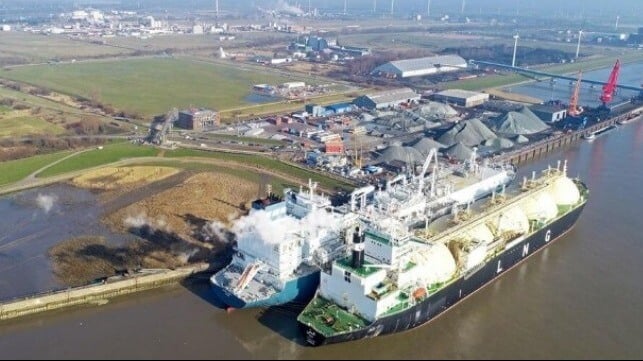EU Approves "Exceptional" $4B Subsidy for German LNG Import Terminals

The EU Commission has approved a request from the German government to spend $4.2 billion on state subsidies for four floating terminals that import LNG, supporting Northern Europe's urgent transition away from Russian pipeline gas supplies. State subsidies are restricted under EU competition rules, but the EC determined that Germany's spending proposal was justified and reasonable.
The aid package will support Deutsche Energy Terminal (DET), a state-owned company, in operating four floating storage and regasification units (FSRUs) stationed along Germany's northern coast. The special-purpose piers for these FSRUs are located in Brunsbüttel, Stade and Wilhelmshaven.
The floating terminals were hastily chartered during the height of Europe's energy crisis in December 2022, and Germany agreed to pay high day rates to ensure that it could get enough LNG to fuel its economy. It was an expensive stopgap measure to replace pipeline gas from Russian state-owned energy firm Gazprom, which was turning off the tap.
Germany set up a state-owned operation and marketing company, DET (Deutsche Energy Terminals), to manage the FSRUs. The company leases out the terminals' receiving capacity to European gas importers on a short- and medium-term auction basis. The difference between the auction revenue and the actual chartering cost generates a recurring loss for DET, and the grant money from the German government will make the company whole.
The aid package could swell to $5.2 billion if losses exceed current projections. The plan has a sunset provision: German authorities have pledged to decommission the floating terminals in Brunsbüttel and Stade once permanent onshore facilities are completed at these locations, and will then sublet the two unused FSRUs to other charterers on the global market.

that matters most
Get the latest maritime news delivered to your inbox daily.
Environmental groups have criticized Germany's heavy investment in new fossil LNG infrastructure, arguing it could lock in natural gas dependence for decades to come. However, the trend may have peaked, according to the Institute for Energy Economics and Financial Analysis (IEEFA): LNG imports into the EU have declined and the rush to build new terminals appears to be slackening.
"Europe’s LNG terminal construction spree might be coming to an end, with some countries delaying or canceling infrastructure. Since the beginning of 2023, new terminals or expansions have been shelved in Albania, Cyprus, Ireland, Latvia, Lithuania and Poland. It is unclear whether three planned terminals in Greece will go ahead," said Ana Maria Jaller-Makarewicz, lead energy analyst, Europe, at IEEFA.
